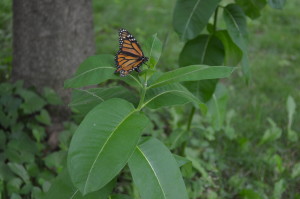Good news for monarch butterflies comes with the announcement from Iowa State University about a new statewide effort to support the habitat of monarchs.
While some of the partners might raise eyebrows, funding has to come from somewhere and at least this is an admirable cause to support.
Here is more about this week’s announcement from ISU:
AMES, Iowa — Enhancing the monarch butterfly’s habitat in rural and urban Iowa is the goal of a new, broad-based statewide effort.
The Iowa Monarch Conservation Consortium, established through the efforts of Iowa State University’s College of Agriculture and Life Sciences, the Iowa Department of Agriculture and Land Stewardship and the Iowa Department of Natural Resources, will take a science-based approach to enhancing monarch butterfly reproduction and assist community-led implementation efforts.
Initial partners in the Iowa Monarch Conservation Consortium include farmer and conservation organizations, state agencies, companies and Iowa State.
“The consortium will offer opportunities to connect rural and urban communities in a common goal to ensure monarchs remain part of Iowa’s landscape,” said Craig Hill, a Milo farmer and president of the Iowa Farm Bureau Federation.
Joe McGovern, president of the Iowa Natural Heritage Foundation, said, “The consortium will build on Iowa’s experience in related conservation efforts and can make great strides in benefiting monarchs. We look forward to getting the word out to all Iowans about how they can help increase monarch habitat.”
The monarch butterfly is an iconic species for the Midwest, and Iowa is the heart of the butterfly’s breeding range.
Nationally, declines in monarch butterflies have been attributed to loss of overwintering habitat, and the loss of milkweed habitat. Monarchs depend on milkweed plants for laying their eggs and for caterpillar nutrition. As adults, monarchs also rely on other plants for nutrition.
Iowa State University will lead research to develop cost-effective methods to establish and maintain milkweed plants in both rural and urban settings.
“The bottom line is that while we are proceeding with a sense of urgency, we also will use and develop sound scientific understanding to guide the development of cost-effective, productive monarch habitat,” said Sue Blodgett, chair of the Department of Entomology at Iowa State.
“Applying the best available science to improving the monarch’s reproductive success is important for our state and the nation,” she said. “The new consortium may lead to collaborations with other Midwestern states in the monarch’s breeding range.”
Research will evaluate criteria for optimal reproduction-promoting habitats, including the mix of milkweed species and companion plants, and the size and spacing of milkweed patches. Scientists also will refine surveying and monitoring methods to establish a baseline for monarch populations and habitat enhancements for assessing the performance of renewed conservation efforts.
Farmer extension and outreach will be led by Iowa State University Extension and Outreach, state agencies and Iowa farmer organizations. Extension programs will deliver practical, “how to” information for conserving and restoring monarch butterfly breeding habitat on farms and rural areas.
“Delivering science-based extension information for both farmers and the general public helps raise awareness and motivation, and ensure a higher likelihood of successfully supporting monarch butterfly populations,” said Blodgett.
Educational programs for the general public will be delivered through consortium member organizations. The consortium also will reach out to youth groups such as 4-H clubs, FFA chapters and others.
The first efforts of the consortium can be seen this spring, as Iowa State University plants seedlings of milkweed on research farms around the state.
Last month ISU planted 10,000 seeds of nine different milkweed species in greenhouses. Seedlings will be transplanted into small demonstration plots on 13 ISU research farms. Also, two of the milkweed species will be transplanted or direct seeded into larger research habitat plots to study how the plants grow, proliferate and adapt to local conditions. Researchers will formulate and plant a monarch seed mix that includes milkweed and nectar-producing prairie plants. Through the year, researchers will monitor butterflies in the plots from egg and larvae through adult stages.
The consortium’s initial efforts complement a recently announced national campaign by the U.S. Fish and Wildlife Service, which plans to establish on-the-ground monarch conservation projects, including a goal of planting 200,000 acres of milkweed.
Funding and support for the Iowa Monarch Conservation Consortium will come from contributions of partnering organizations and other sources.
Initial partners in the Iowa Monarch Conservation Consortium are: Iowa State University, Iowa Department of Agriculture and Land Stewardship, Iowa Department of Natural Resources, Iowa Cattlemens Association, Iowa Corn Growers Association, Iowa Farm Bureau Federation, Iowa Soybean Association, Iowa Turkey Federation, Practical Farmers of Iowa, Iowa Natural Heritage Foundation, Iowa Nature Conservancy, DuPont Pioneer, Monsanto and Soil and Water Conservation Society.


When our 3 boys were youngsters , it was such a thrill and learning experience to see the Monarchs fill our small grove to rest as they flew South. I always had milkweed , plus during this fall migration I would add fruits , sand pools , ect so they could refresh and replenish . These past years , instead of thousands of butterfly’s resting in out grove , it has declined to hundreds . I have a 5 acre field on 13 acres total .. No pesticides. If I can help in any way , please let me know. I will increase my milkweed and also plant other flowers in the field. This is a pasture that now has been left to grow tall. We have been planting fruit trees and fruiting bushes . We are surrounded by corn/ soy that are sprayed . The butterfly’s have no place to go for food after they leave our small space . Thank you and I will talk to my neighbors about leaving some waterways open for milkweed. Eileen
Sounds like a great proactive plan, Eileen. Thanks for what you’re doing for our monarch butterflies!